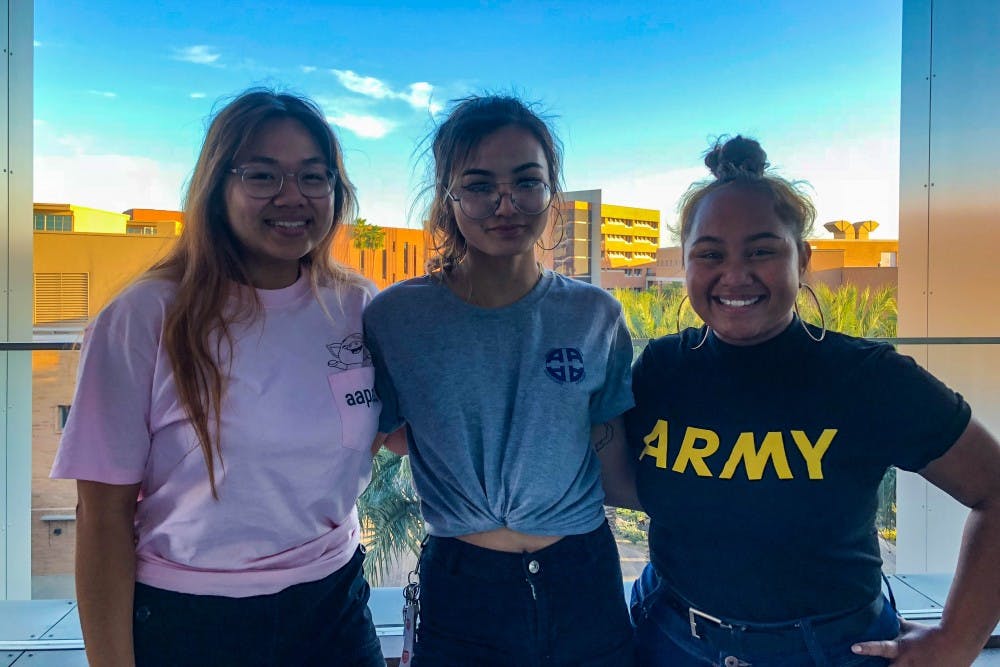Feeling grouped together and misunderstood were feelings students from the Southeast Asian American Student Association said they deal with constantly.
However, Asian American and Pacific Islander Heritage Month provides a unique opportunity for these students and their communities to feel a unique sense of camaraderie and belonging among their peers.
According to University data from the fall 2018 semester, 7.4% of ASU undergraduates identify as Asian and 0.2% of undergraduates identify as Native Hawaiian/Pacific Islander.
Brandie Ramarui, a sophomore psychology student and the secretary of SEAASA, said that Asian American and Pacific Islander Heritage Month is a time to bring about cultural awareness, emphasis and pride in being Asian American or Pacific Islander.
“I'm Pacific Islander and I know my culture is always overshadowed, and I feel like isn't really looked into in-depth,” Ramarui said. “And so this month is a good month for us to definitely put pride in it and to share more than what people see, which is like more than like their resorts or the traditional dancing. It's a lifestyle, it's a culture thing.”
Linda Keo, a sophomore majoring in biochemistry and the president of SEAASA, said that growing up she struggled with her identity and didn’t fully accept her heritage until she got older.
“Having a month of being in an environment where everyone, like the Asian coalition here, celebrate it, all the Asian clubs come together and they all have their own events, their own meetings and everyone's really embracing their own identity — it's an awakening for myself and an empowerment for myself,” Keo said.
Summer Tran, a sophomore studying criminology and the vice president of SEAASA said she also struggled with her identity growing up but said she "came to her senses pretty quick.”
“It's a month of embracing your culture, being proud of who you are,” Tran said. “And especially being Southeast Asian, we do get overshadowed by East Asians. So it's a good way to just get our identities and traditions out there for people to understand that we're just more than anime and K-pop and all that stuff. It’s deeper than that.”
Tran said she feels a lot of people at ASU aren’t aware of what Southeast Asian students are as a community and feels that they are grouped with international students and also said this heritage month is a way for her community to have a defined voice.
“I feel like — not necessarily that we're in the shadows, but we're kind of 'just there' to them,” she said. “I feel like this month gives us a defined (time) where people will notice and where people are able to speak up about ... issues. Especially with Pacific Islander culture, they still get overshadowed by Asian Americans. So I feel like having a dedicated month allows people to have a louder voice.”
Ramarui said she feels like the spotlight on her community is a little brighter during this month, adding that "it encourages people to put their voice in a lot more. Not only that, but it also brings people together, especially in the Asian and Pacific Islander community."
Ramarui said that because she’s involved in an organization that represents Asian Americans and Pacific Islanders, she does feel represented at ASU but feels that it’s something you have to continuously strive for.
“I feel like there's more room for that kind of recognition for Pacific Islanders, which is why I appreciate this month more, and it's why I try to strive more to make it more known,” she said.
Keo said there have been issues with Undergraduate Student Government when trying to organize food for their events and that this ties in with people grouping Asian countries together.
“Speaking for other Asian clubs on campus, a lot of people have trouble finding funding for their food because ASU did not want to pay for the ethnic food that felt like Southeast Asian culture,” she said. “They only have one Chinese restaurant, and if we didn't want order from there, then we had to find our own money for it.”
Ramarui echoed Keo’s sentiment and said during an event they hosted with another organization, the food that was provided was not accurate to the culture, saying “it was basically like an authentic Mexican event, but them ordering Taco Bell.”
Jamie Ingrisano, the coordinator for Associated Students of ASU, said in an emailed statement that when it comes to funding, USG must comply with the University policy which says student organizations must use an authorized catering service for on-campus events.
"USG does not have any control over the approved caterer list restaurants and food suppliers are responsible for applying to be on the list and demonstrating that they are able to meet the standards set by the University," read Ingrisano's email. "Clubs that want (to) have a particular restaurant or vendor be added to the list can direct the restaurant/vendor to the application process. It is my understanding that this list is updated on a regular basis."
Keo said she feels that there isn’t an in-depth knowledge of her culture when it comes to people who aren't, or don't identify as, Asian American or Pacific Islander. She also noted that Asian American and Pacific Islander Heritage month can show people how diverse and different each Asian culture actually is, something not everyone realizes.
“When people think Asia, they think China, Japan, Korea,” she said. “Everyone forgets about the Southeast Asian countries like Laos, Thailand, Cambodia, Vietnam. ... Well, they might have heard of it, (but) some people haven’t and they also don’t know the culture around it.”
Reach the reporter at bstoshne@asu.edu and follow @itsbrennaaaa on Twitter.
Like The State Press on Facebook and follow @statepress on Twitter.




